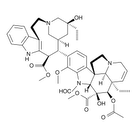Articles tagged with: Vincristine
News»

The use of thalidomide (Thalomid) in induction and maintenance therapies for multiple myeloma patients receiving a stem cell transplant resulted in better overall response rates but did not significantly improve overall survival, according to a Phase 3 study recently published in the journal Blood.
In their study, researchers randomly assigned 556 patients to receive three cycles of either vincristine (Oncovin), doxorubicin, and dexamethasone [VAD] or thalidomide, doxorubicin (Adriamycin), and dexamethasone (Decadron) [TAD] as induction therapy. All patients received high-dose melphalan (Alkeran) with an autologous stem cell transplant, …
News»

A recent study published in the Journal of Clinical Oncology determined that patients who achieved very good partial response (VGPR) or better after high-dose chemotherapy and stem cell transplantation experienced significantly longer event-free and overall survival.
“Very good partial response” is one of the terms defined by the International Myeloma Working Group (IMWG) to categorize how patients respond to treatment. According to IMWG criteria (see related Beacon news), patients reach very good partial response when the level of abnormal “M” proteins in their blood decreases by 90 percent.
Previous studies evaluating …
News»

The results of a recent Phase 3 clinical trial indicate that treatment with high-dose melphalan (Alkeran) prior to a stem cell transplant results in a longer period of remission for myeloma patients than treatment with reduced-intensity melphalan. The differences in remission duration were larger for patients younger than 60 years old.
Based on the significant difference in progression-free survival between the two treatment groups, the researchers concluded that high-dose (200 mg/m2) melphalan is more effective in preparing younger, medically fit multiple myeloma patients for stem cell transplants. However, reduced-intensity (100 mg/m2) …
News»

The results from a new study indicate that treatment of newly diagnosed multiple myeloma with novel therapeutic agents improves kidney function in most patients, in comparison to treatment with conventional chemotherapy and a high-dose regimen of dexamethasone (Decadron). The authors of the study presented the results of the clinical trial on December 8 at the 51st American Society of Hematology (ASH) Annual Meeting and Exposition.
Multiple myeloma patients commonly experience complications with kidney function, and kidney impairment is associated with increased mortality rates. The Myeloma Beacon recently published a series …
Resources»

Chemotherapy, also known as anti-cancer agents or antineoplastics, is a treatment that kills cancer cells. It can be taken orally (by mouth), or intravenously (through the vein). High-risk multiple myeloma patients with advanced stages of myeloma are often treated with chemotherapy.
Chemotherapy aims to suppress multiple myeloma by targeting cancer cells which characteristically grow at uncontrollable rates. Chemotherapy is toxic to cancer cells and takes effect as the cells multiply. However, chemotherapy can also eliminate healthy cells - especially ones that divide rapidly in the body. For example, cells in the lining …
Resources»
 Vincristine (brand name, Oncovin), also known as leurocristine, is a vinca alkaloid from the Madagascar periwinkle (Catharanthus roseus, formerly Vinca rosea and hence its name). It is a mitotic inhibitor, and is used in cancer chemotherapy. [...]
Vincristine (brand name, Oncovin), also known as leurocristine, is a vinca alkaloid from the Madagascar periwinkle (Catharanthus roseus, formerly Vinca rosea and hence its name). It is a mitotic inhibitor, and is used in cancer chemotherapy. [...] 